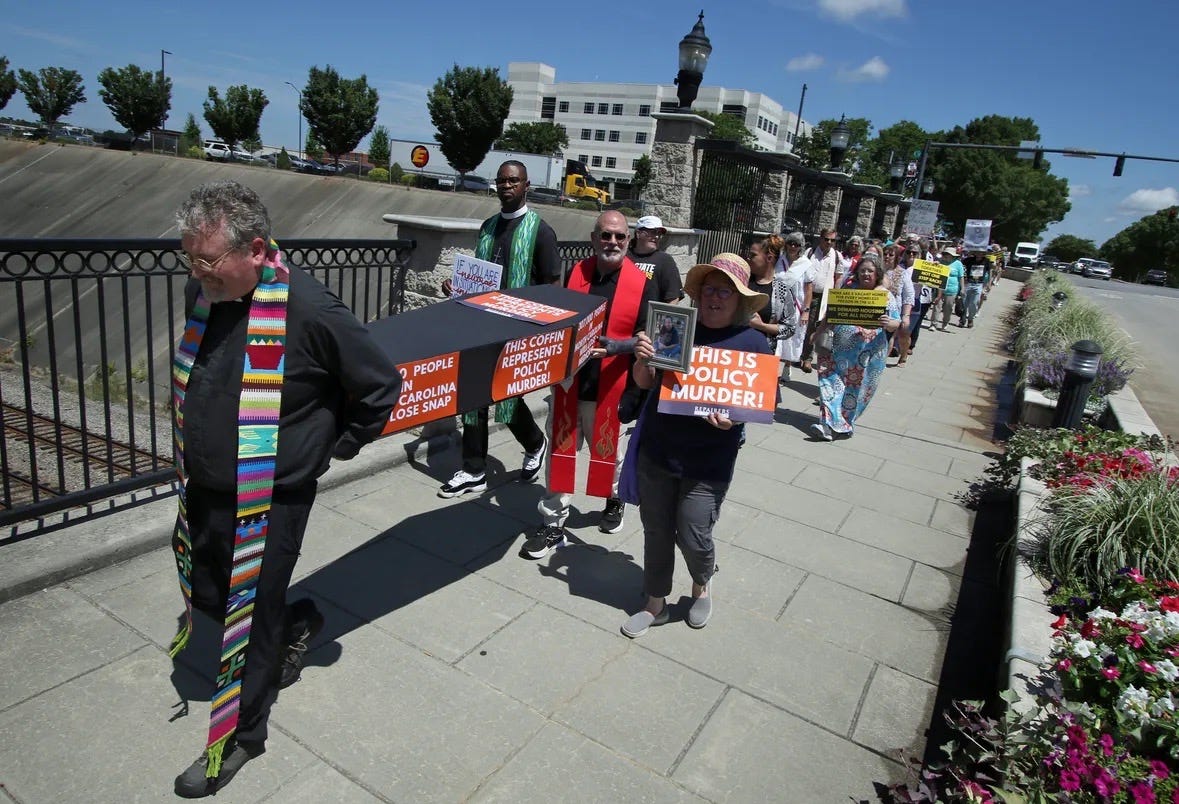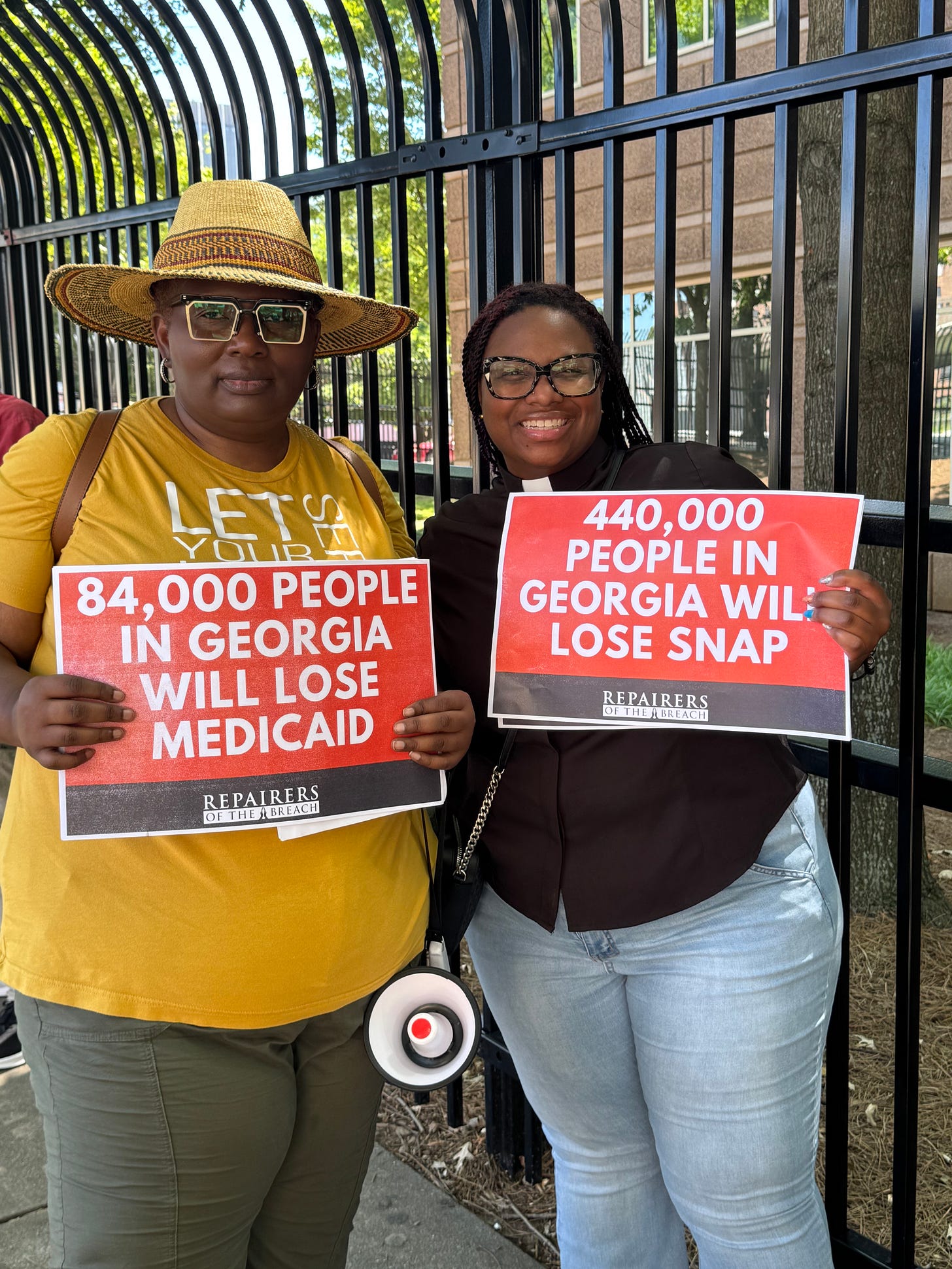Moral Mondays Go South
How communities are uniting to defy policies that kill & lies that cover up policy murder
133 years ago in Memphis, Tennessee, three men were lynched by off-duty law enforcement officers who’d been hired to intimidate them. Ida B. Wells knew these men. They were her friends, and she knew their deaths weren’t unavoidable tragedy. They were murders. Public lies about them and their character were an attempt to cover up the real reason for their deaths - that the business they ran as Black men threatened a local white business.
But Ida B. Wells refused to accept the deaths, and she refused to accept the lies. She devoted her life to telling the truth about lynching because she knew the truth could save other lives. In the face of murderous evil, she declared that telling the truth about unnecessary death is what it means to stand up for life.
In a dozen cities and towns across the South yesterday, local Moral Monday coalitions rallied in the spirit of Ida B. Wells to launch a campaign that refuses to accept the lies about policies that will kill people in our communities.
Bishop Barber explained at our flagship event in Memphis, TN why we decided to mobilize in response to Congress passing Trump’s Big Ugly Bill. We came with caskets because those of us who have to bury the dead refuse to let politicians lie and say they are pro-life while they pass policies that lead to unnecessary death.
Why We Brought Caskets to Southern Senators
At our Moral Monday in Memphis yesterday, I was reminded of something we learned from the Rev. Jim Lawson, who invited Dr. King to Memphis in 1968: mass rallies are for mass education.
In Greenville, SC, local clergy and moral leaders joined people who will be hurt by cuts to Medicaid and SNAP to educate the local community about the pain that is coming because of this policy. They delivered a casket to the office of Sen. Lindsey Graham, who voted for the bill, along with a report from Repairers of the Breach outlining the Big Ugly Bill’s impact on Southern states in particular.
The Greenville Times produced this short film covering their action.
Moral Mondays are always about creating a platform for the people who are hurt first and worst by policy violence. In Jackson, MS, Margaret Deavors came with local clergy to say how she and so many like her will be hurt by cuts to healthcare. “If you want more people to be dependent and unhealthy - Mississippi is already one of the most unhealthy states, and this bill is taking away what I think is every person’s right to have some basic level of healthcare.”
Local ABC affiliate WAPT produced this story.
Because the Big Ugly Bill triples the size of ICE, making it not only the largest federal law enforcement agency, but also bigger than all but 15 of the world’s militaries at a moment when the agency is sending masked men to terrorize US communities, yesterday’s Moral Mondays also lifted the voices of immigrants who are being targeted. In Atlanta, clergy and moral activists rallied outside the ICE Field Office.
In Memphis, a young woman named Valeria shared her confusion about why her parents and other pillars of the community like them are being targeted.
When Ida B. Wells started telling the stories of lynchings in the late 19th century, she noticed a pattern: the further away newspapers were from the people they wrote about, the easier it was for them to publish lies. But when the local community told stories they knew about people, the lies fell apart. Wells dispelled the lies that propped up the violence of Southern lynching by helping communities draw near and hear directly from the people who were being targeted.
This is what moral leaders in Memphis and Greenville and Atlanta and Jackson were doing yesterday. We did it together with colleagues in Gastonia, North Carolina, Charleston, West Virginia, Austin, Texas, Little Rock, Arkansas, Baton Rouge, Louisiana, and Sarasota, Florida. In each location, after we lifted the stories of the people impacted by policy violence, we carried a casket to the local office of a member of Congress who voted for the Big Ugly Bill.

We marched in blistering heat and, for a couple of delegations in South Florida, in driving rain. We did not come because we expected these members of Congress to change their minds. We came because, like Ida B. Wells and so many before us, we refuse to accept the lies that we know will lead to unnecessary deaths.
We came to register our moral dissent because we know we are not alone. Millions of Americans know this pain - or will - and they need to see that there is a moral movement they can be part of to build power and change the conversation about what is possible in our public life.
We came yesterday to launch a new phase in this campaign, and we are clear about this: we aren’t going anywhere. We’re marching forward together, not one step back.








I am heartened by the increased coverage of your Moral Monday actions.
Thank you for your powerful work.
Thank you Bishop Barber for the wonderful work you are doing to save and heal our democracy from the fascist tyrants!